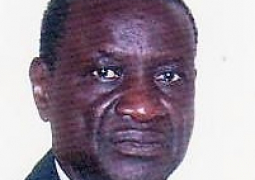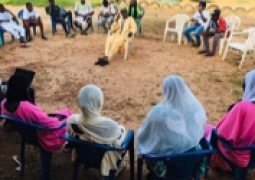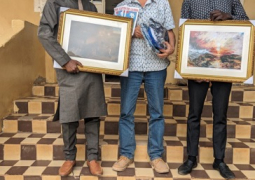
“He who votes, hopes.” But what happens when that hope becomes hollow—when the rituals of democracy—elections, constitutions, speeches—fail to transform the daily lives of ordinary people?
Ghana's President John Dramani Mahama put it bluntly: “Nobody cares about democracy; what the people want is good governance—a government that offers opportunities and prosperity to the people.” In that statement lies a profound challenge to every leader across Africa, including here in The Gambia.
Democracy: The Promise and the Pain
Since 2017 The Gambia has continued its democratic journey, marked by renewed freedoms, open dialogue and growing participation in national affairs. Citizens are more engaged, civil voices stronger, and the spirit of accountability gradually taking root.
Yet across Africa a sobering truth persists: many citizens still express dissatisfaction with how democracy works in practice. While most prefer democracy to any other form of government, significant portions believe their country is either a “democracy with major problems” or “not much of a democracy at all.” They see laws favouring a few, courts that sometimes fail to deliver justice, and leaders who behave as though power belongs to them—not to the people.
Two Cautionary Tales
In Cameroon, President Paul Biya extended his four-decade rule by winning the October 2025 election with a little over 53 per cent of the vote, amid opposition claims of unfairness and protests. Many Cameroonians spoke of stalled economic prospects, persistent poverty and regions ravaged by conflict, yet for which regular elections brought little tangible change.
In Tanzania, the recent October 29, 2025 election once again raised the question: is an election alone enough? With the main opposition candidates barred or detained, hundreds of young Tanzanians took to the streets—especially in the commercial city of Dar es Salaam—to voice that the contest felt like a “coronation” rather than a choice.
When the protests broke out, the government imposed a curfew, shut down internet access nationwide and deployed the military to the streets. Opposition parties assert that hundreds may have died in the ensuing unrest. These events show that the mere act of voting does not guarantee legitimacy, accountability or the translation of public will into public good.
These cases remind us that elections, while necessary, are not sufficient by themselves. Without good governance, transparency, accountability and real alternatives, democracy can become a hollow ritual.
Good Governance: What It Should Be
President J. Mahama’s words invite us to re-examine the foundations of leadership and governance. What is good governance if not the very scaffolding on which democracy stands?
Justice — not just laws on paper but fairness in courts, equality before the law, transparency in every process.
Service — schools that truly educate, hospitals that heal, roads that connect, water that flows, electricity that stays on.
Responsiveness & Accountability — leaders who listen, who admit mistakes, who face consequences, and who serve rather than rule.
Trust — institutions that are incorruptible, media free to speak, and citizens who believe their voices matter.
Lessons for The Gambia
The examples of Cameroon and Tanzania serve both as a mirror and a map for The Gambia:
Mirror: We must examine where our own democracy may have become more performance than progress—where elections occur but outcomes remain empty; where citizens vote yet see no tangible change.
Map: The way forward is visible if we are willing to walk it—strengthen the rule of law, ensure transparency in public expenditure, demand accountability, empower civil society, protect the free press.
In Tanzania, local observers highlighted how the protests were less about one man and more about a system they believed denied choice. The unrest underlines the fact that when elections are perceived as pre-determined, the democratic process loses its meaning. In Cameroon, decades of regular ballots have not translated into broad-based economic or social progress, reminding us that democracy without delivery is at best symbolic.
Hope Is Not Lost
Still, there is light. Across this region are citizens—young and old—who no longer want democracy in name only, but governance that delivers. Civil society groups are rising, the media is uncovering wrongs, and young voices are demanding integrity. These are the seeds of renewal.
President J. Mahama’s statement—“good governance over mere democracy”—is not a rejection of democracy but a warning. Democracy without delivery becomes empty. It turns into a ritual, a show—and when it ceases to serve the people, it risks being lost altogether.
The Cry for Good Governance
Good governance is what gives life to democracy. It is not just about elections and speeches—it is about integrity, accountability and results. It is when roads are built, hospitals function, teachers are paid, and young people find hope in honest work.
A nation does not prosper simply because it has a constitution—it prospers because it has leaders who serve with compassion and competence. The cry of the people isn’t against democracy—it is against the emptiness of democracy without delivery.
A Call to Conscience
As a people, we must look beyond slogans and symbols. True progress comes when citizens demand responsibility, not just representation; when voters choose vision over tribe, and leaders place nation above self.
Democracy is only as strong as the hearts of those who practise it. The ballot paper is not just a piece of paper—it is a sacred trust. It carries the power to shape destinies and change the course of a nation.
As we prepare for elections in the coming year, let us use democracy to choose leaders who will transform and prosper our nation. Let us remember that democracy is the tool—but good governance is the goal.
For in the end, the world will not remember how loudly we shouted “democracy,” but how faithfully we lived out its promise.
Read Other Articles In Feature





